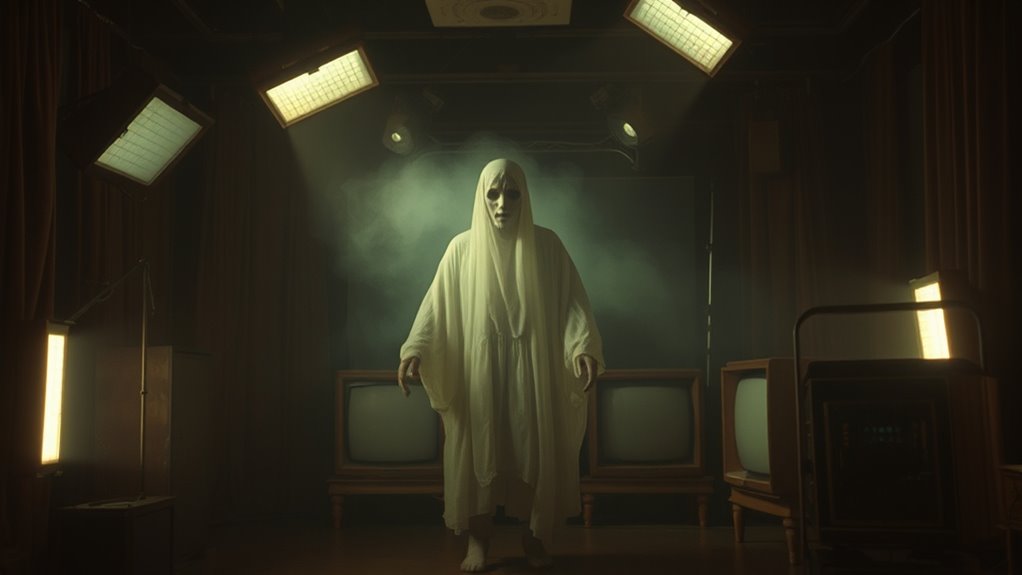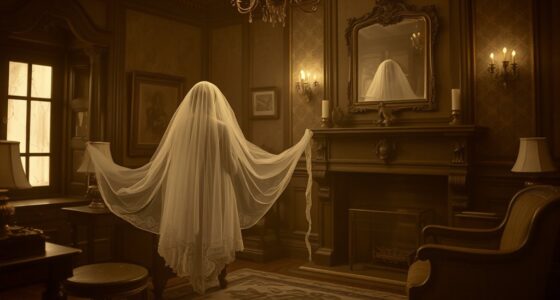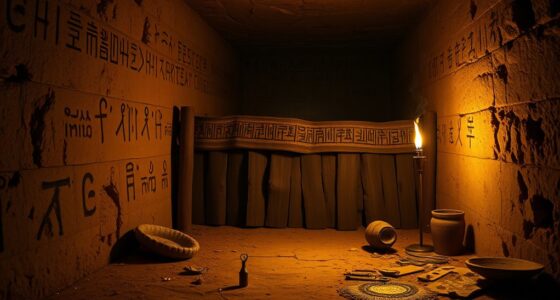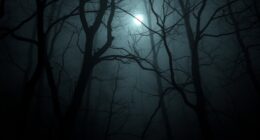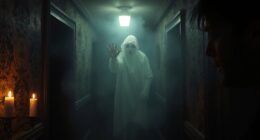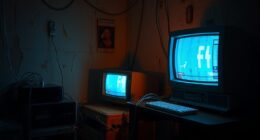“Ghostwatch” was a 1992 BBC Halloween hoax that tricked viewers into believing they watched a live paranormal investigation. Using staged footage, live cameras, and convincing actors, it blurred the line between fact and fiction, causing widespread shock and fear. The broadcast exposed how media can manipulate reality and influence perceptions. If you keep exploring, you’ll discover more about how this infamous stunt challenged trust in televised stories and haunted audiences long after.
Key Takeaways
- “Ghostwatch” was a 1992 BBC televised hoax claiming to document a live paranormal investigation.
- It used scripted paranormal activity, live cameras, and real-time reactions to create a sense of authenticity.
- Many viewers believed the events were real, causing widespread fear and controversy.
- The show blurred fact and fiction, raising ethical questions about media deception and psychological impact.
- It remains a landmark example of TV manipulation, highlighting media’s power to evoke genuine fear and challenge trust.

Have you ever wondered how a single televised hoax can blur the line between reality and fiction? “Ghostwatch: The BBC’s Halloween Hoax” is a prime example of how the BBC created a chilling illusion that fooled millions, making viewers question whether they were watching a genuine ghost investigation or a cleverly scripted stunt. This broadcast, aired on October 31, 1992, was presented as a live paranormal investigation into the supposedly haunted Brookside Close estate. As you watch, you’re drawn into the atmosphere of fear and suspense, but what you don’t realize is that the entire production was carefully staged to mimic authentic paranormal activity. The use of live cameras, urgent commentary, and real-time reactions gave the illusion of spontaneity, making it seem as if genuine spirits were manifesting before your eyes.
A televised hoax blurring reality and fiction through staged paranormal investigation on live TV.
The BBC’s decision to produce “Ghostwatch” was a bold move in media deception. They wanted to push the boundaries of what television could achieve by blending entertainment with a sense of reality. To you, it appears as a real-time investigation, with the presenters—two journalists and a psychic—interacting with the supposed paranormal forces. But in truth, every element was scripted, from the eerie noises to the sudden ghostly apparitions. The show’s creators aimed to tap into the public’s fascination with the supernatural, but the impact was far-reaching. Many viewers believed they were witnessing actual paranormal activity, leading to widespread fear and controversy afterward.
What makes this hoax so striking is how convincingly it manipulated your perception of media and reality. The broadcast exploited the common tropes of paranormal investigations—creepy backgrounds, unexplained phenomena, and emotional reactions—to heighten the sense of authenticity. As you watch, it’s easy to forget that it’s a scripted performance designed to evoke real fear. The BBC’s media deception was so effective that some viewers felt genuinely disturbed, with complaints pouring in about the disturbing content. This stunt challenged the trust people had in televised programming, exposing how easily media can distort truth to entertain or shock.
Ultimately, “Ghostwatch” remains a landmark in the history of media deception, demonstrating how television can craft convincing illusions that blur fact and fiction. It forces you to question not only the authenticity of paranormal investigations on TV but also the intentions behind the stories you’re told. The broadcast’s success lies in its ability to make you feel immersed in a real paranormal encounter, even though it was purely a manufactured illusion. This clever manipulation of media and perception leaves a lasting impression on how you view supernatural stories and the power of televised storytelling.
Frequently Asked Questions
How Did Ghostwatch Influence Future Live Television Broadcasts?
You see, the event changed how live broadcasts handle ethics and media deception. It showed that viewers could be misled, prompting broadcasters to develop stricter guidelines to prevent deception. This incident made producers more cautious, emphasizing transparency and responsible storytelling. As a result, future live shows are more aware of ethical boundaries, ensuring audiences aren’t tricked or misinformed, ultimately shaping a more trustworthy media landscape.
Were There Any Legal Repercussions for the BBC After the Hoax?
You wonder if the BBC faced legal repercussions after the hoax. The answer is, not directly. The BBC’s response was swift, issuing apologies and clarifications, but no significant legal action followed. The controversy was more a storm of public outrage than courtroom battles, leaving the broadcaster to weather the backlash and learn from the chaos. So, while the legal repercussions were minimal, the BBC’s reputation took a hit, like ripples spreading outward.
Did the Hoax Impact Public Trust in Broadcasting?
You might notice that the hoax increased public skepticism toward broadcasters, making people question the truth behind TV shows. It challenged media credibility, leading viewers to be more cautious about trusting scripted content or sensational stories. This event forced audiences to think critically about what they see on screen, prompting a shift toward greater media literacy. Overall, it left a lasting impact on how the public perceives the honesty of broadcast media.
Were Any Actors or Crew Members Publicly Affected by the Controversy?
You might find it ironic that, despite the intense controversy, some actors and crew members faced little public fallout, while their psychological impact lingered. The hoax’s reputation likely caused career repercussions for those involved, yet few publicly acknowledged it. Their experience highlights how, even when careers seem unaffected, the emotional toll can be profound, revealing the hidden costs behind the controversy’s surface.
Has Ghostwatch Been Officially Released or Available for Viewing Since 1992?
You’re curious if Ghostwatch has been officially released or available for viewing since 1992. Since its original broadcast, no official video recordings or releases have been made, and it remains largely unavailable for online viewing. Despite numerous unofficial copies circulating online, the BBC hasn’t authorized an official release, keeping the controversial program largely inaccessible to the public today.
Conclusion
You see, Ghostwatch reminds us that truth and entertainment can blur easily. While the BBC’s stunt shocked many, it also sparked debates about honesty in media. Remember, a little caution goes a long way—don’t believe everything you see on Halloween or any day. As the saying goes, “The truth will out,” but sometimes, it’s wrapped in a ghostly illusion, leaving you to wonder what’s real and what’s just a haunting trick.
